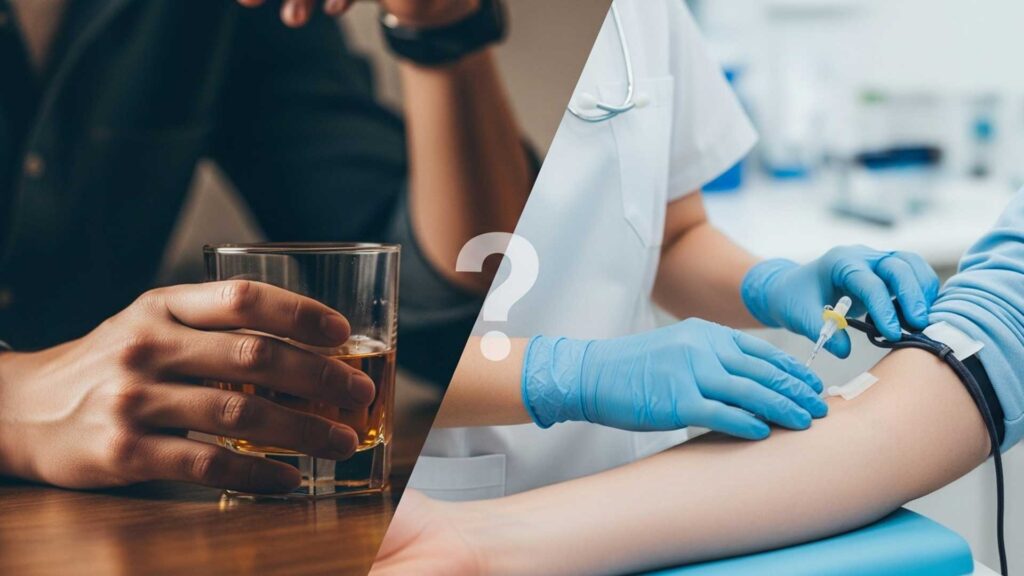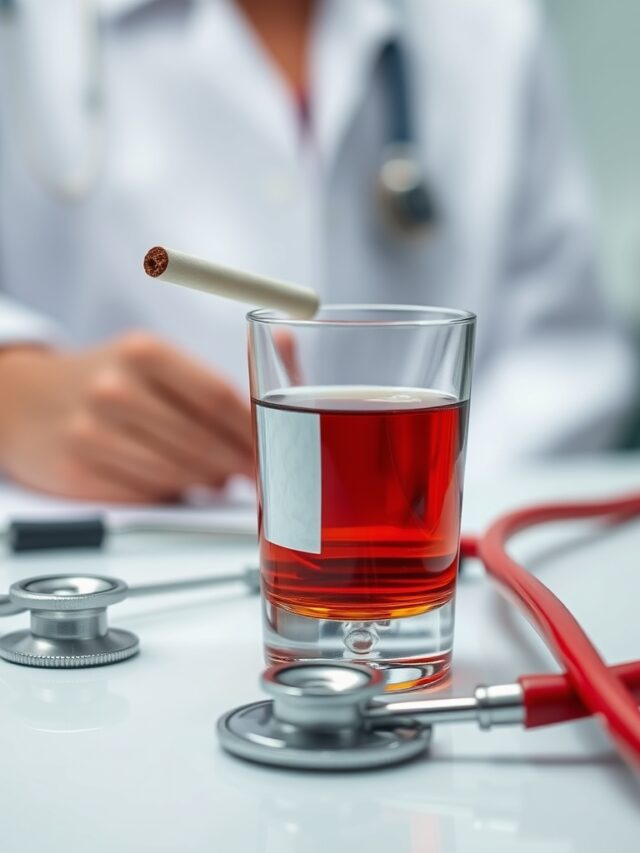You have a routine health check-up scheduled for tomorrow morning. You’ve been diligent, following all the instructions, including the fasting requirements. But as you unwind in the evening, you wonder, “Will the glass of wine I’m having tonight be a problem?” Or perhaps you’re a smoker, and the first thing you do upon waking is light a cigarette. You pause, thinking, “Will this affect my results?”
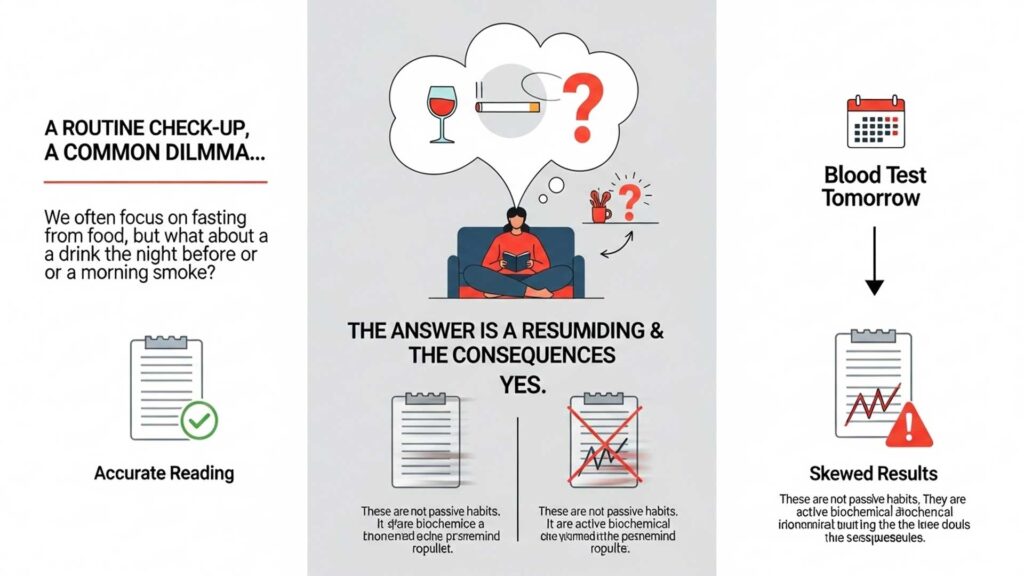
It’s a common dilemma. We often think of blood test preparation in terms of food, but what about other lifestyle choices? The answer is a resounding yes. Not only can smoking or alcohol affect blood test results in significant ways, but specific tests can also reveal their use, sometimes long after consumption. These are not passive habits; they are active biochemical agents that can alter your body’s chemistry, potentially leading to inaccurate readings, misdiagnosis, and unnecessary anxiety.
This guide provides a deep, evidence-based answer to this critical question. We will explore exactly how these substances skew your results, whether a blood test can detect alcohol consumption or smoking, and the precise blood test preparation instructions you should follow for the most accurate snapshot of your health. Understanding what not to do before blood test is as crucial as knowing what to do.
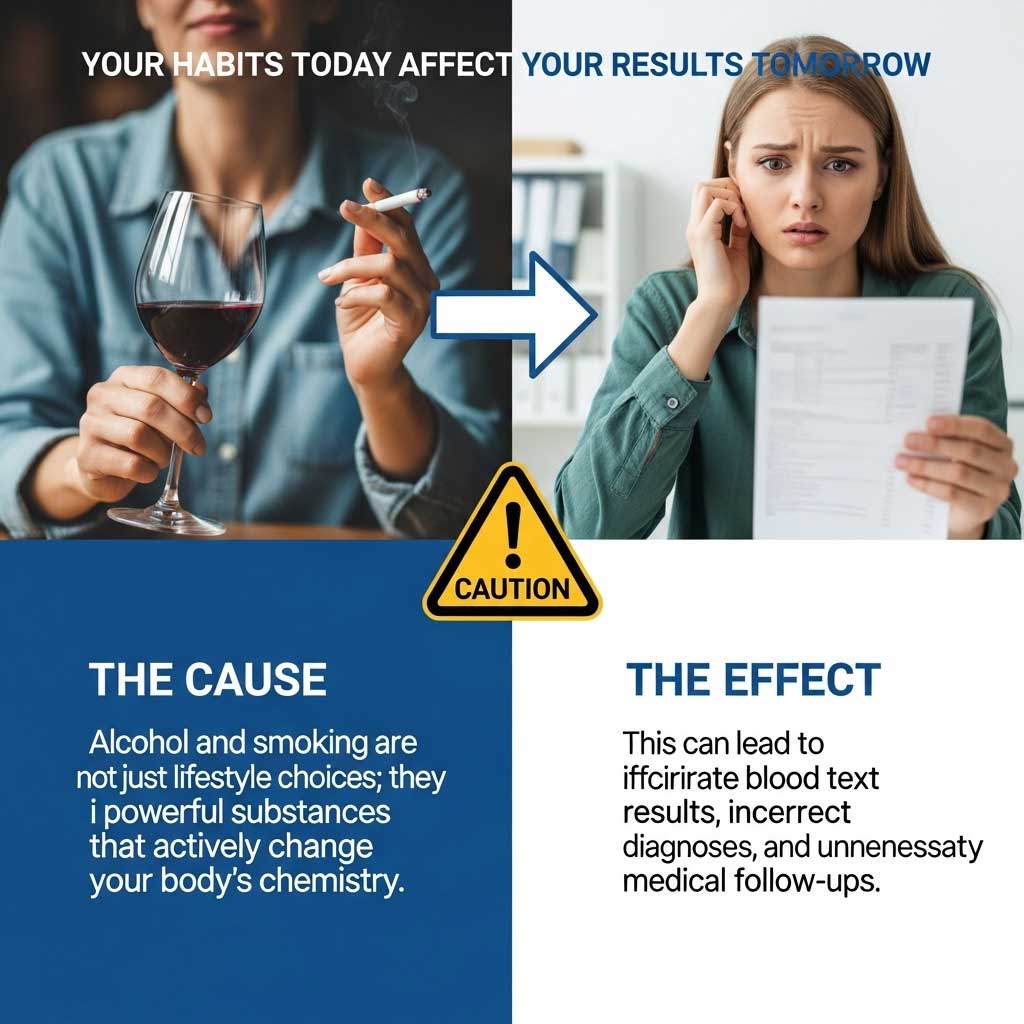
The Impact of Alcohol on Your Blood Work
When you consume alcohol, your body prioritizes its metabolism above almost everything else. This process, primarily handled by the liver, triggers a cascade of effects that are clearly visible in a blood test after alcohol consumption. Having alcohol before blood test India is one of the most common reasons for skewed results, yielding a report that doesn’t reflect your true baseline health.
The Liver Function Test (LFT): A Direct Hit
This is the most well-known and significantly impacted test. Your liver is the primary site for breaking down alcohol, and this strenuous process causes stress and inflammation in the liver cells. Your blood test results after drinking alcohol will most clearly show this stress.
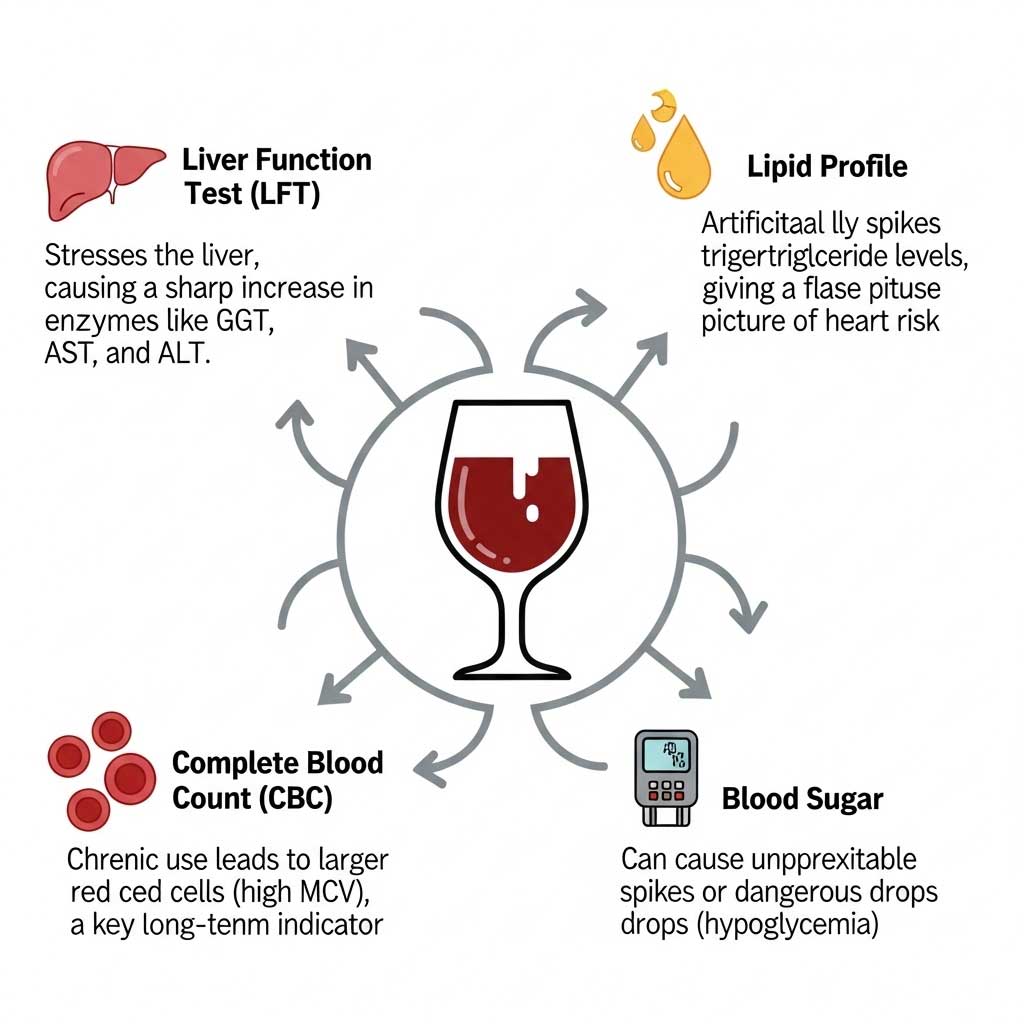
Gamma-Glutamyl Transferase (GGT/GGTP): The Telltale Marker
If there is one single marker that acts as a red flag for recent alcohol consumption, it is GGT. This enzyme is highly sensitive to alcohol. When the liver is working hard to process alcohol, GGT levels in the blood rise. An elevated GGT blood test and alcohol consumption are very closely linked.
Even moderate drinking—a couple of beers or glasses of wine—within 24 to 72 hours before your test can cause a significant, temporary spike in your GGT levels. A doctor seeing this result out of context might suspect chronic liver issues, leading to further investigations. This makes the alcohol and liver function test (LFT) interaction a critical one to understand.
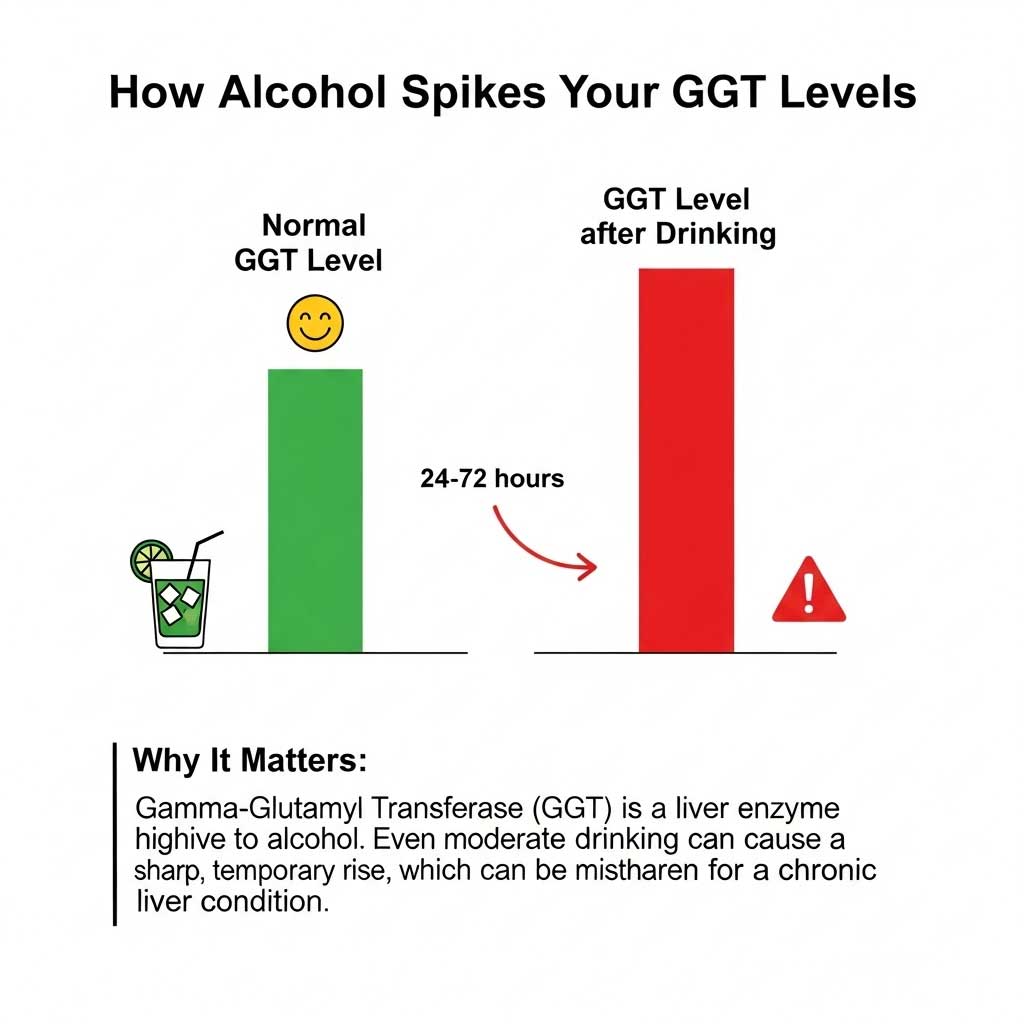
AST and ALT: Other Key Liver Enzymes
Aspartate Aminotransferase (AST) and Alanine Aminotransferase (ALT) are other important liver enzymes measured in an LFT. Their levels can also rise after drinking. Doctors often look at the ratio of AST to ALT. An AST/ALT ratio greater than 2:1 is a strong indicator of alcohol-related liver stress or damage.
The Lipid Profile: More Than Just Cholesterol
The question of “can I drink beer the night before a blood test?” is most relevant here. The answer directly concerns your triglycerides. When you drink alcohol, your liver processes the calories and converts a portion of them into triglycerides, a type of fat. This leads to a higher level of triglycerides circulating in your bloodstream. A single night of drinking can cause a significant, temporary spike, giving an inaccurate picture of your cardiovascular risk. Therefore, the link between alcohol and lipid profile test results is a crucial one.
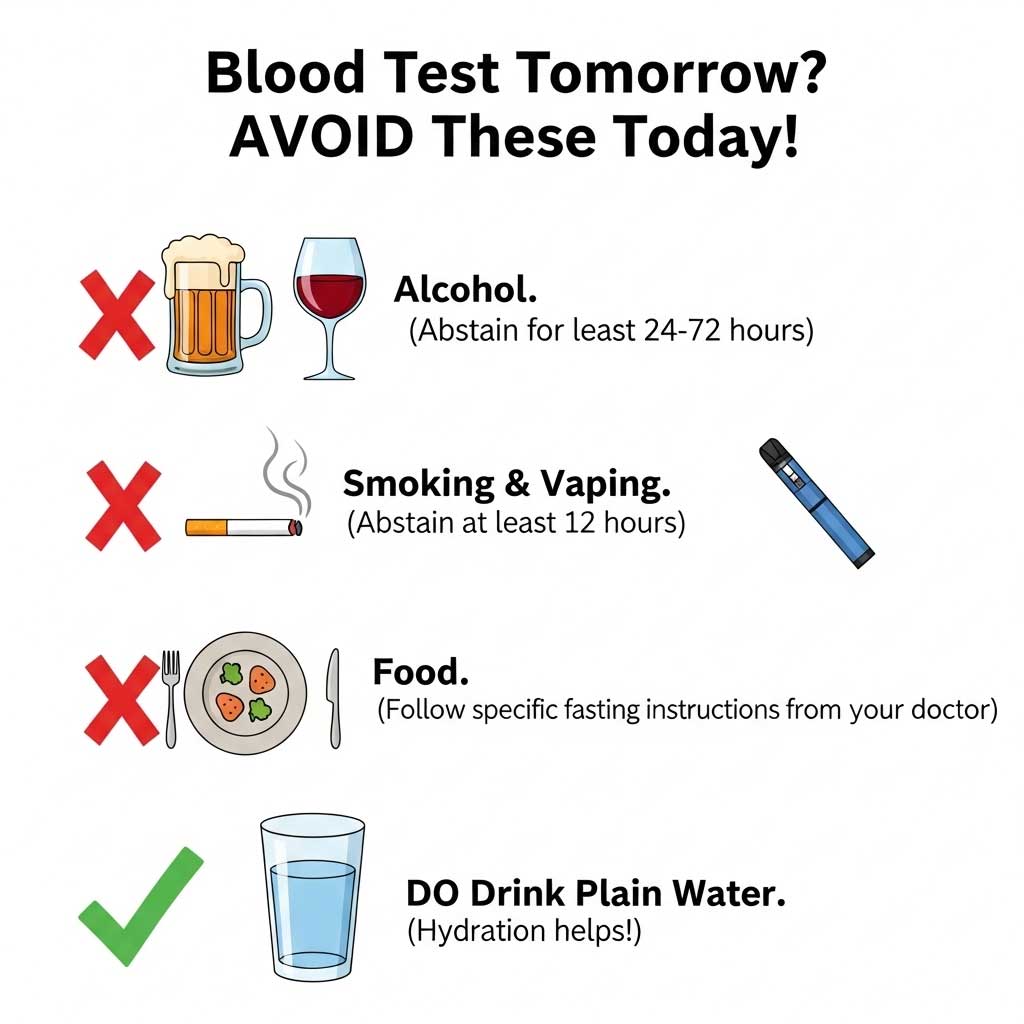
The Complete Blood Count (CBC): A Long-Term View
Many people ask, “can cbc test detect alcohol?” A standard CBC won’t show if you had a drink last night. However, it can provide strong clues about chronic, long-term alcohol use through a specific marker: the Mean Corpuscular Volume (MCV).
MCV measures the average size of your red blood cells. Chronic alcohol consumption is toxic to the bone marrow where these cells are produced, causing them to be released while they are still immature and larger than normal. This condition, known as macrocytosis (a high MCV), is a classic indicator on a CBC report of long-term heavy alcohol use.
Can a Blood Test Detect Alcohol Consumption?
Yes, absolutely. The question, “can blood test detect drinking?” has a clear answer. Detection can happen in two ways: through indirect markers found in routine tests, and through specific, direct tests designed to find alcohol metabolites.
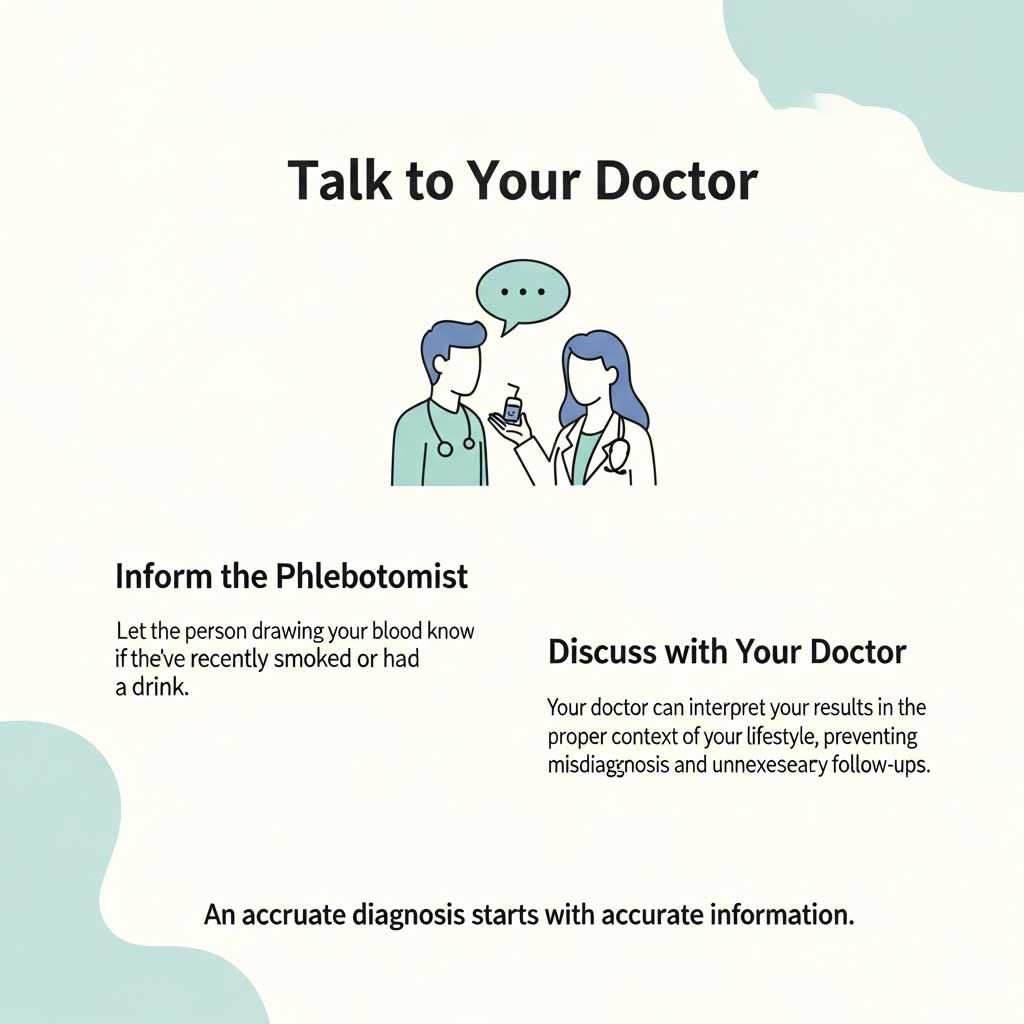
Indirect Markers: The ‘Clues’ in Routine Tests
As discussed, routine tests don’t explicitly say “alcohol detected,” but they provide strong clues to a knowledgeable doctor.
- LFT: A high GGT level is a major red flag for recent drinking.
- CBC: A high MCV is a classic sign of chronic heavy drinking.
- Lipid Profile: Unusually high triglycerides can also point towards recent alcohol consumption.
Direct Markers: The ‘Proof’ with Specialized Tests
For a definitive answer, specific tests are used. This is which blood test for alcohol is ordered when direct detection is required.
- Ethyl Glucuronide (EtG) Test: EtG is a direct metabolite of ethanol (drinking alcohol). A blood test alcohol screen for EtG can detect alcohol consumption for up to 24-36 hours after drinking.
- Phosphatidylethanol (PEth) Test: This is a highly sensitive and specific test. PEth is an abnormal phospholipid that is only formed in the body in the presence of alcohol. Because it attaches to red blood cells, it has a much longer detection window, revealing a person’s drinking patterns over the previous 2-3 weeks.
So, while a doctor might infer drinking from a routine test, a does blood test detect alcohol query has a definitive “yes” with specialized tests like EtG and PEth.
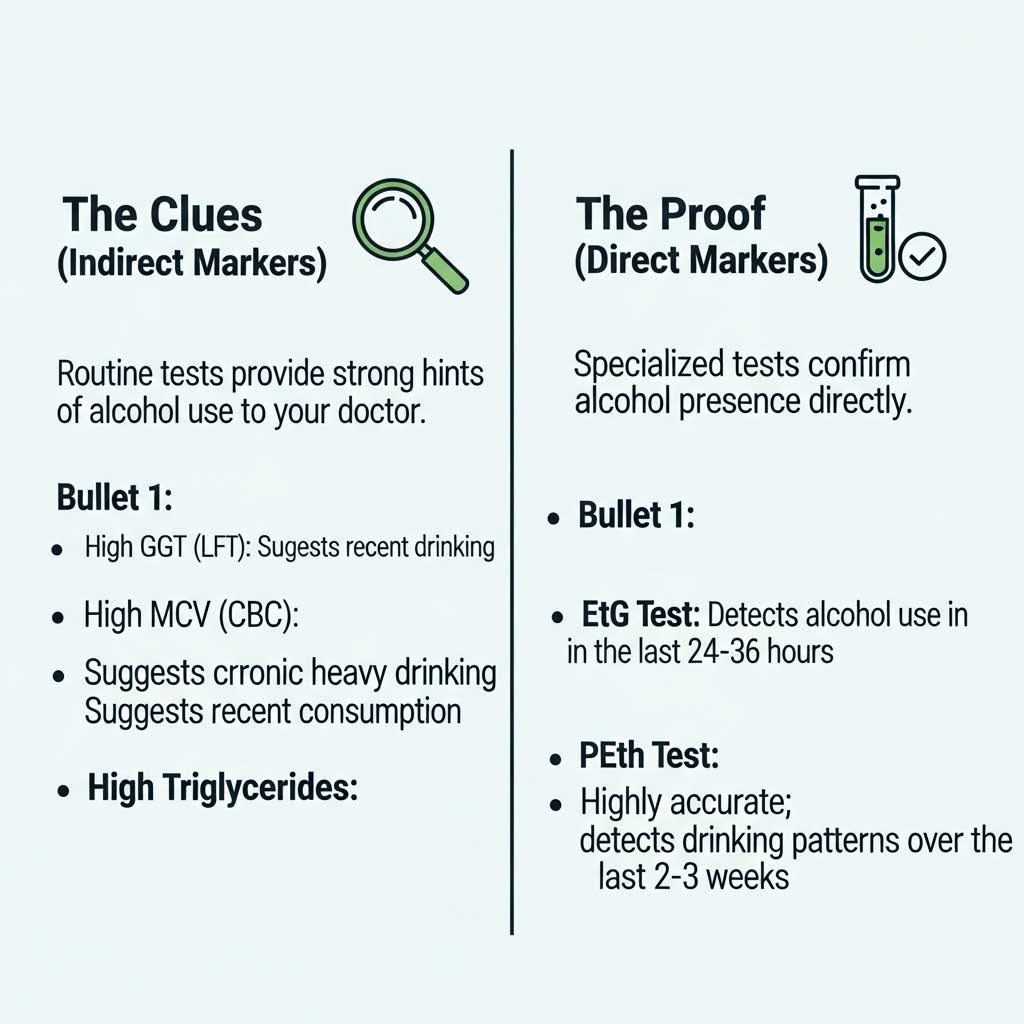
How Smoking Skews Your Blood Test Results
If alcohol is a metabolic disruptor, smoking is a systemic inflammatory agent. The thousands of chemicals in cigarette smoke trigger changes that are clearly visible in a blood test.
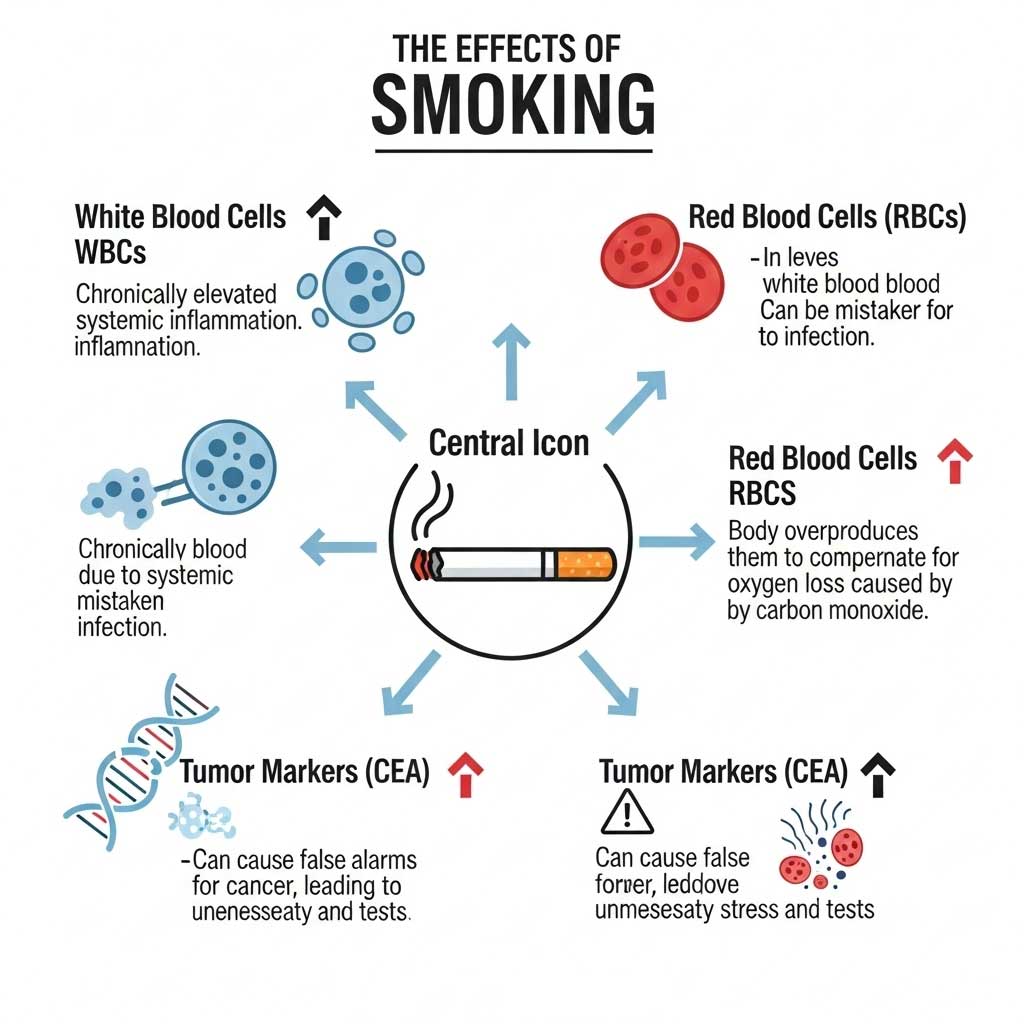
The Complete Blood Count (CBC): A Response to Stress
A routine smoking and CBC test can reveal a lot. Smokers consistently show elevated levels of White Blood Cells (WBCs) due to chronic inflammation, often in the 10,000-13,000 cells/mcL range, which could be mistaken for an infection. Furthermore, due to carbon monoxide exposure, the body overproduces red blood cells, leading to artificially high RBC, Hemoglobin, and Hematocrit counts.
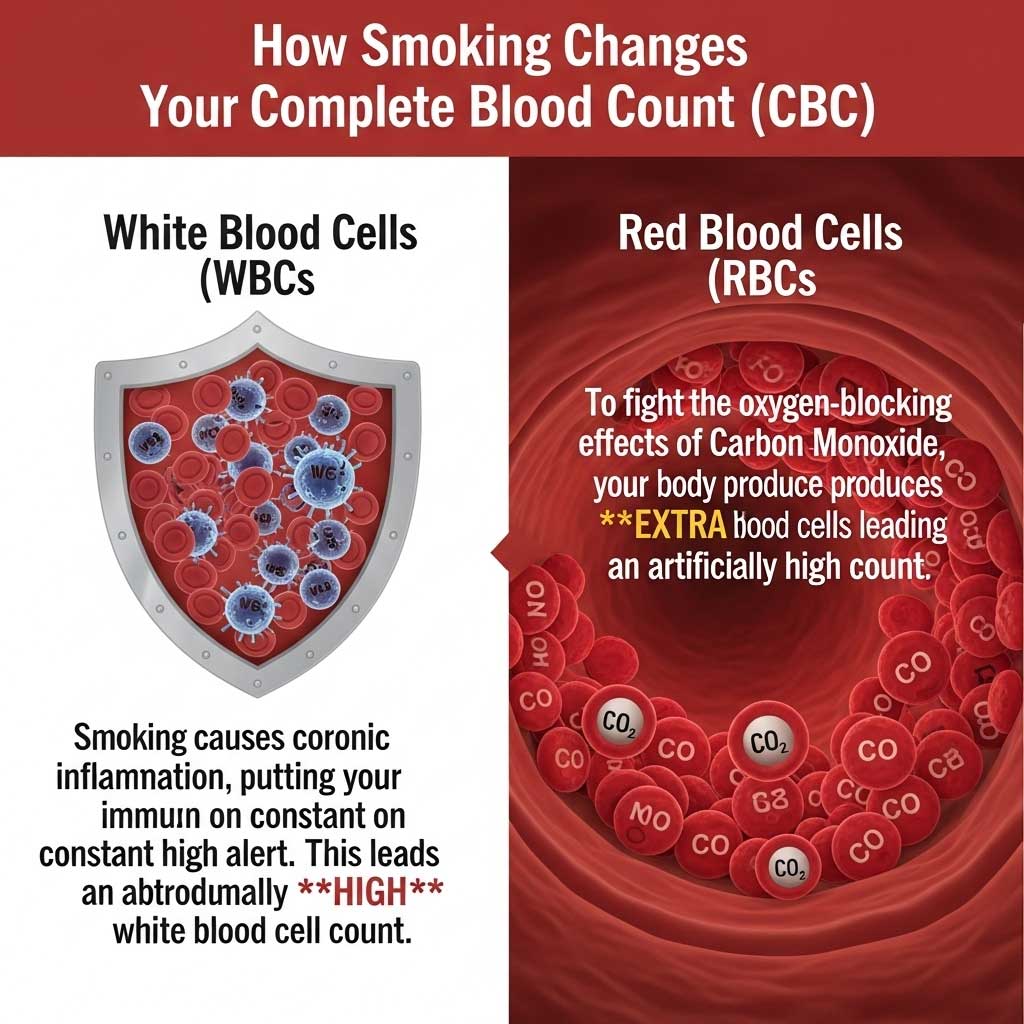
Tumor Markers: The Risk of a False Alarm
This is a serious consequence. Smokers have a significantly higher baseline level of Carcinoembryonic Antigen (CEA), a tumor marker. An elevated smoking and CEA blood test result can trigger a false positive, leading to immense patient anxiety and costly, invasive follow-up tests to rule out cancer.
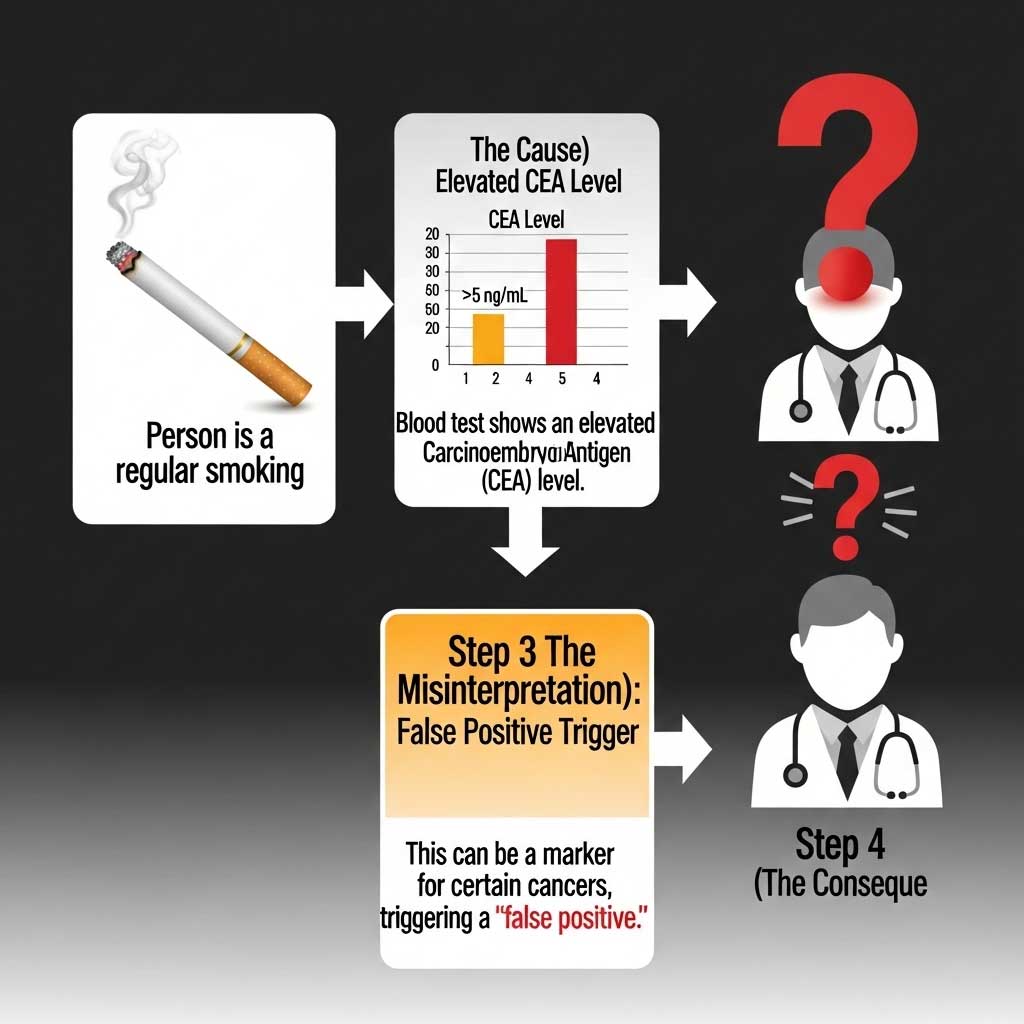
Will a Blood Test Show If You Smoke?
Yes, just like with alcohol, the answer is definitive. A blood test can show if you smoke, both indirectly through routine tests and directly through a specific test.
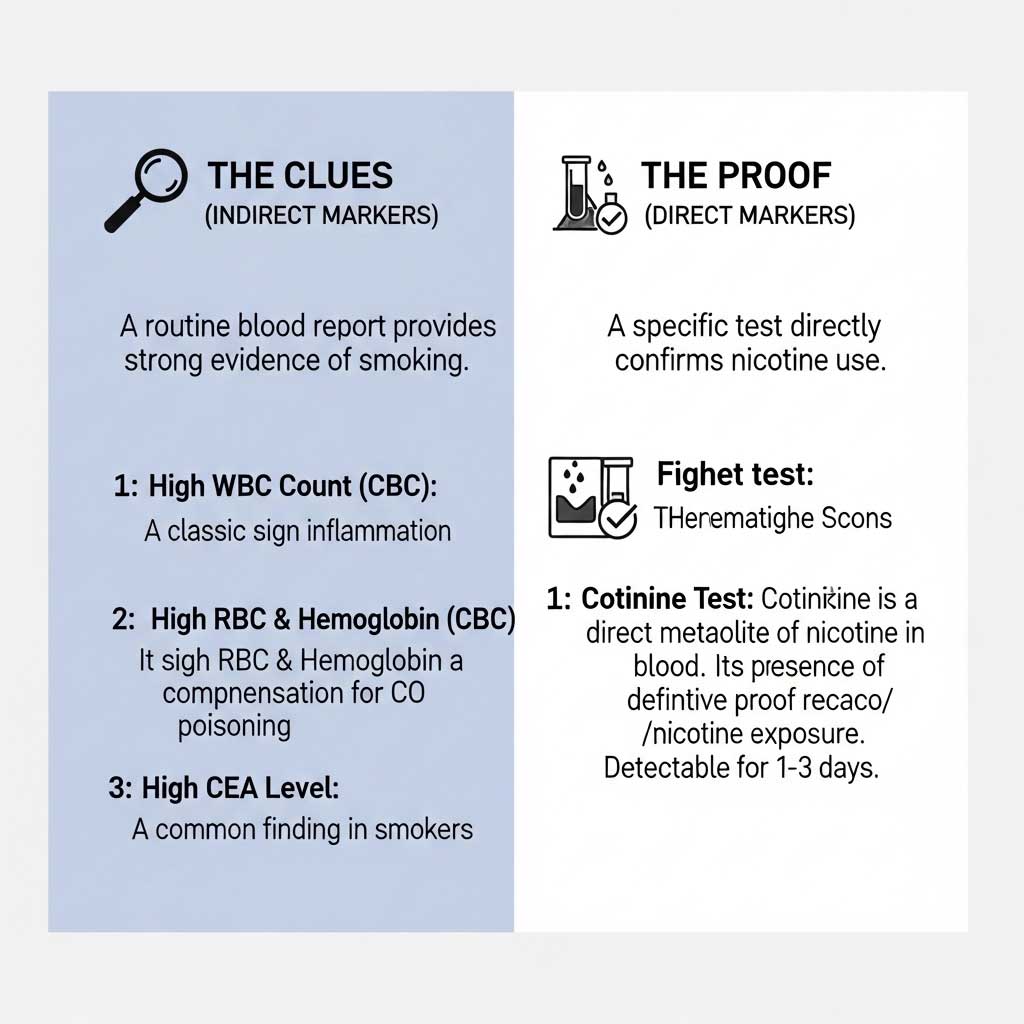
The Indirect Evidence
A doctor seeing a combination of high WBCs, high RBCs, and high CEA on a blood report would have a very strong suspicion that the patient is a smoker, even without a direct test. These are the telltale fingerprints that smoking leaves on your blood work.
The Direct Test: Cotinine
For definitive proof, a cotinine test is used. Nicotine from cigarettes is metabolized by the body into cotinine. A specific blood test can measure the level of cotinine in your blood. Since cotinine is only present if you’ve been exposed to nicotine, it’s a highly accurate way to confirm tobacco use. Cotinine can be detected in the blood for 1 to 3 days after you stop smoking, and even longer in habitual users.
The Golden Rules: Abstinence Guidelines Before Your Test
To ensure your blood test results are accurate, following clear abstinence guidelines is crucial.
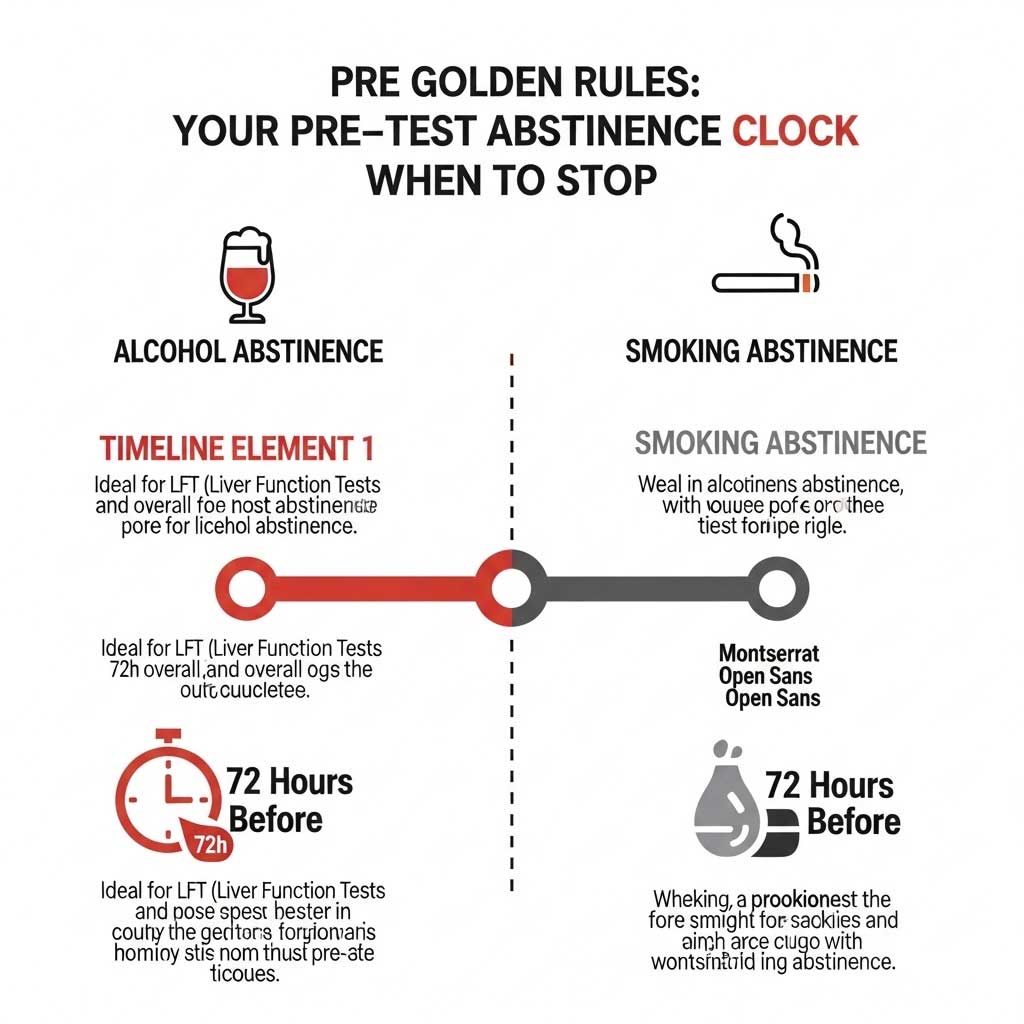
For Alcohol
The question of how long to avoid alcohol before blood test depends on the tests.
- Minimum: Abstain for at least 24 hours.
- Recommended: Abstain for 48 hours.
- Ideal for Liver Function Tests (LFT): Abstain for a full 72 hours for the most accurate liver function results.
For Smoking
- Minimum: Do not smoke on the morning of your blood test. Avoid it for at least 8-10 hours.
- Ideal: Abstain for at least 12 hours before your blood is drawn.
- Be Honest: It is vital to inform your doctor about your smoking and drinking habits so they can interpret your results in the proper context.
Summary Table: Alcohol and Smoking Effects at a Glance
For a quick reference, this table summarizes the key ways smoking alcohol affect blood test results.
| Substance | Blood Test Affected | Specific Marker(s) | How It’s Affected (The Change) | Reason for Change | Recommended Abstinence Period |
| Alcohol | Liver Function Test (LFT) | Gamma-Glutamyl Transferase (GGT), AST, ALT | Significantly Increased | Liver metabolizes alcohol, causing enzyme leakage and stress. | Minimum 24 hrs; Ideal 72 hrs |
| Lipid Profile | Triglycerides | Increased | Liver processes alcohol into triglycerides. | Minimum 24 hrs | |
| Complete Blood Count (CBC) | Mean Corpuscular Volume (MCV) | Increased (Chronic Use) | Alcohol interferes with red blood cell development. | N/A (Indicates chronic use) | |
| Direct Alcohol Test | EtG, PEth | Positive | Direct metabolites of alcohol are present in blood. | Up to 3 weeks (PEth) | |
| Smoking | Complete Blood Count (CBC) | White Blood Cell (WBC) Count | Increased (Chronic Use) | Chronic systemic inflammation. | N/A (Indicates chronic use) |
| Red Blood Cell (RBC), Hemoglobin | Increased (Chronic Use) | Body compensates for oxygen loss due to carbon monoxide. | N/A (Indicates chronic use) | ||
| Tumor Marker Test | Carcinoembryonic Antigen (CEA) | Significantly Increased | Direct effect of tobacco smoke components. | Minimum 12 hrs (for consistency) | |
| Direct Nicotine Test | Cotinine | Positive | Direct metabolite of nicotine is present in blood. | 1-3 days after last use |
Conclusion
Your blood test is a powerful tool, providing a detailed look inside your body. To ensure this data is pure and accurate, you must treat the preparation period seriously. Alcohol and smoking are not passive habits; they are powerful variables that can obscure the truth of your health status. Furthermore, with modern testing, their use can be directly detected, making transparency with your doctor more important than ever.
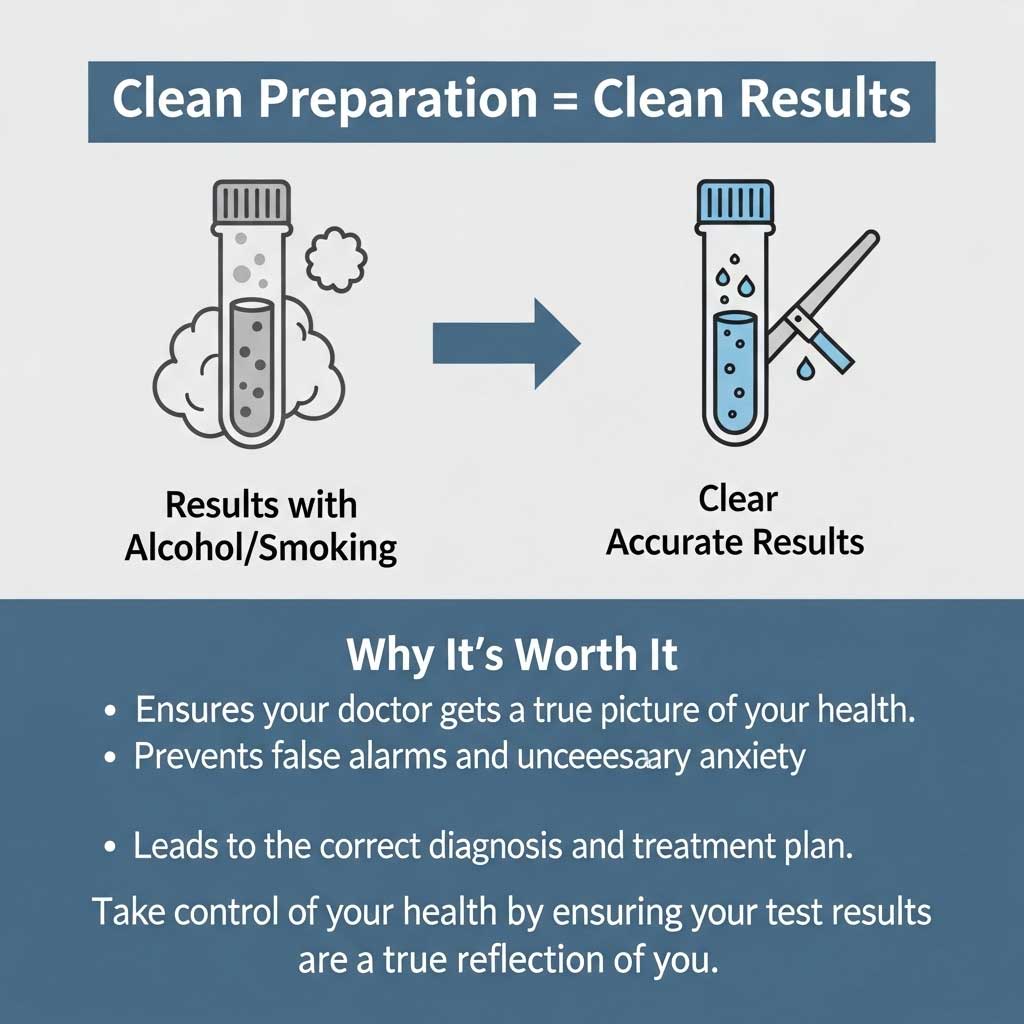
By following the simple abstinence guidelines and being honest with your healthcare provider, you are taking an active role in your own healthcare. An accurate test result is the foundation of good medical care, and by preparing properly, you ensure that foundation is solid, reliable, and a true reflection of you.
Frequently Asked Questions (FAQs)
1. I only had one beer last night. Will it really affect my LFT?
Yes, it very well could. The GGT enzyme is very sensitive and can become elevated even after just one or two standard drinks within 24 hours of the test.
2. I’m a heavy smoker. Will my WBC count ever be normal?
If you are a chronic smoker, your baseline White Blood Cell (WBC) count will likely remain elevated. If you quit smoking, your WBC count can begin to return to normal levels over several months to years.
3. Does smoking or drinking affect a fasting blood sugar test?
Yes. Alcohol can cause your blood sugar to drop (hypoglycemia) hours after consumption. Nicotine from smoking can cause a short-term spike in blood sugar. Both can lead to an inaccurate fasting glucose reading.
4. What is the difference between a GGT test and an EtG test for alcohol?
A GGT test is an indirect marker; it measures a liver enzyme that rises due to alcohol-related stress. An EtG test is a direct marker; it detects a specific metabolite that is only present if you have consumed alcohol.
5. What about vaping or e-cigarettes? Do they affect blood tests?
Yes. Vaping delivers nicotine, which will cause a positive cotinine test and lead to the same immediate effects as cigarettes (spikes in glucose, cortisol, etc.). It is best to avoid vaping before a blood test.
6. If I quit smoking, how long will a cotinine test be positive?
For a casual user, cotinine is typically undetectable in the blood after 1-3 days. For heavy, long-term smokers, it may remain detectable for a week or slightly longer.
7. Can drinking lots of water “flush out” the alcohol before a test?
No. Water cannot speed up the rate at which your liver metabolizes alcohol. Your liver processes alcohol at a fixed rate, and while hydration is good, it will not clear alcohol or its metabolites from your system any faster.
8. Will my cholesterol levels be affected by a single night of drinking?
While your total cholesterol, LDL, and HDL may not change dramatically, your triglyceride levels can spike significantly after just a single night of drinking, which will make your lipid profile report inaccurate.
9. Can a routine blood test for a job or insurance detect alcohol or smoking?
Routine health checks often include a CBC and LFT. An experienced doctor could infer habits from high GGT, MCV, or WBC counts. Some insurance or pre-employment screenings may specifically include direct tests like cotinine or EtG, so it is best to be honest and prepared.
10. I forgot and had a cigarette this morning. Should I reschedule my blood test?
It is best to call the lab or your doctor’s clinic and inform them. For some tests (like glucose or cortisol), it can cause a temporary spike. They will advise you on whether it’s better to proceed or reschedule for the most accurate results.

